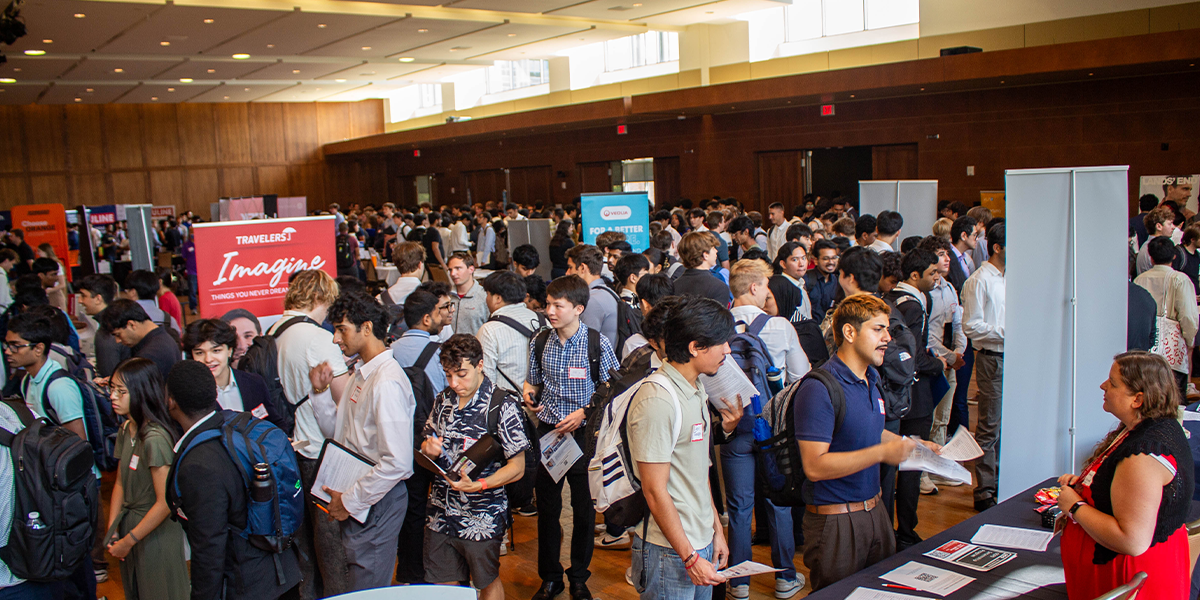
During September’s career fair, CDIS spoke with 12 tech employers to learn how students can stand out — and land jobs and internships — at top companies.
By Rachel Robey
On September 17, hundreds of students filed into Union South’s Varsity Hall for the School of Computer, Data & Information Sciences (CDIS) Career Fair. Featuring 37 employers ranging from Silicon Valley tech giants like Google to local leaders like Epic and Fetch, CDIS’ fall career fair was a valuable chance for students to connect with top employers for internships, full-time roles, co-ops, and networking opportunities.
Just before the career fair doors opened to students, CDIS interviewed 12 of the participating employers to learn exactly what they’re looking for — and how students can land internships and jobs. Below are their top takeaways, filled with career advice, job interview tips, and ideas for how to get an internship.
Note: For a full list of participating companies and future updates on the Spring 2025 Career Fair, head to the CDIS Career Fair page.
1. Technical skills are the baseline.
Naturally, having basic technical skills is essential for any potential candidate hoping to make it through first-round screening. For CDIS students, that means understanding a variety of programming languages, good standing in your class, and knowledge of different software and programs.
That said, employers don’t expect first-time job or internship seekers to know everything right away. “We primarily hire on the basis of aptitude,” says Braegan Adams, recruiter at Epic. “We’ll teach you everything you need to know once you get here.”
Regardless of the job or field you’re applying for, your resume should demonstrate that you fulfill the job’s basic requirements in clear, simple terms. Beyond ensuring the resume is one page, easy to read, and has no spelling mistakes, also include relevant classes, your GPA, graduation year, and any key skills that relate to the job you’re applying for.
Takeaway: Demonstrate competency as well as enthusiasm for learning on the job.
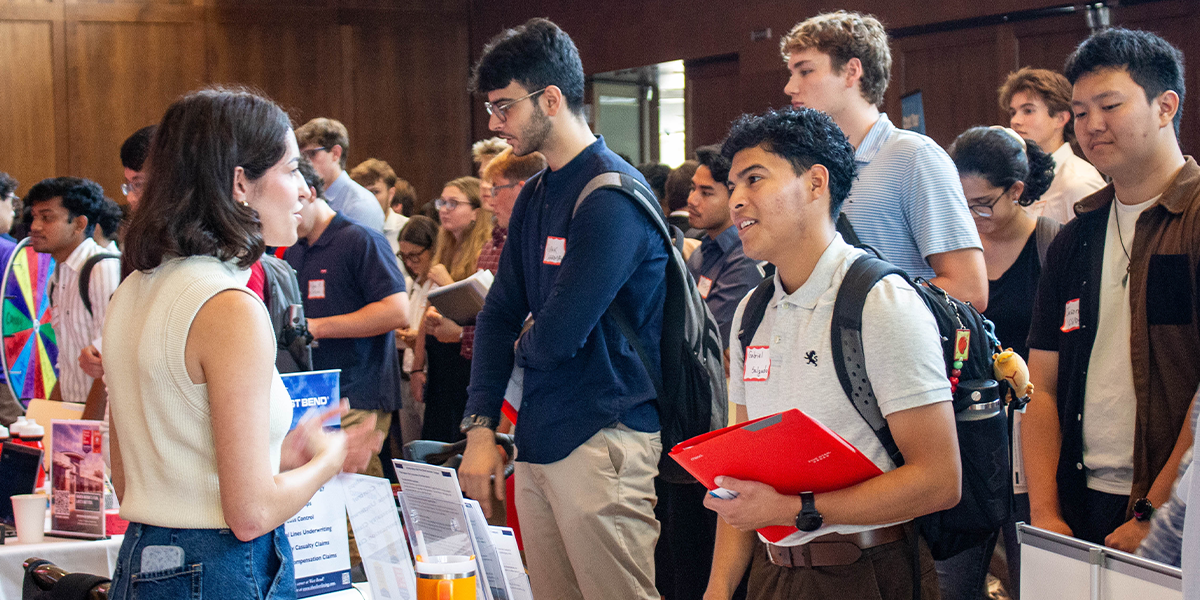
2. Soft skills will set you apart.
Most of the employers interviewed also agreed that the “right candidate” does more than tick the boxes on a job description.
“I’ve read about a hundred million resumes from students, and they all have really similar hard skills,” says Jamie Phillips, senior software engineer at PlayStation. “I look for the other set of skills: Are they someone that communicates really well? That we can collaborate with? That’s willing to learn and improve?”
Here are the top five soft skills that recruiters and hiring managers said they look for:
- Communication and Social Skills: By far, this was the most common soft skill that the employers we interviewed are looking for. “A lot of people are able to just get through the question, but the valuable part is being able to have a conversation and problem solve with the interviewer,” says Shane Takeuchi, software engineer at Google. “Go beyond writing the code and explain what you’re doing and why.”
- Time Management: Employers want to know that you can handle multiple responsibilities and deadlines. They also want a candidate who can be self-directed. In your application and interview process, explain how you stay busy and on top of it all.
- Initiative: Pursuing personal projects “just to learn something new” shows the initiative that employers are looking for, says Alvin Menninga, a software engineering manager at Sentry Insurance. The new recruit who proactively finds ways of providing value and solving problems is every hiring manager’s dream — your resume, cover letter, and interview performance should demonstrate how you can be that sought-after individual.
- Curiosity: While interviewers want to hire someone who already demonstrates talent, they’re also hoping for someone who will continue to learn. “In addition to the skills you do have, be able to highlight the skills you don’t have. As recruiters, we can teach those,” says Marlo Wolf-Dixon, a campus recruiter at ULINE. “What we can’t teach are curiosity, willingness to learn, and hard work.”
- Growth Mindset: “Being receptive to feedback during the interview is really important,” says Annie Canzano, a campus recruiter at DraftKings. “Those soft skills are really underrated, especially in engineering.” Showing that you can take — and learn from — feedback also demonstrates that you can collaborate effectively with a team.
Takeaway: In addition to highlighting your technical skills, show employers that you communicate clearly and positively, manage time well, possess strong work ethic, are eager to learn, and appreciate constructive feedback.
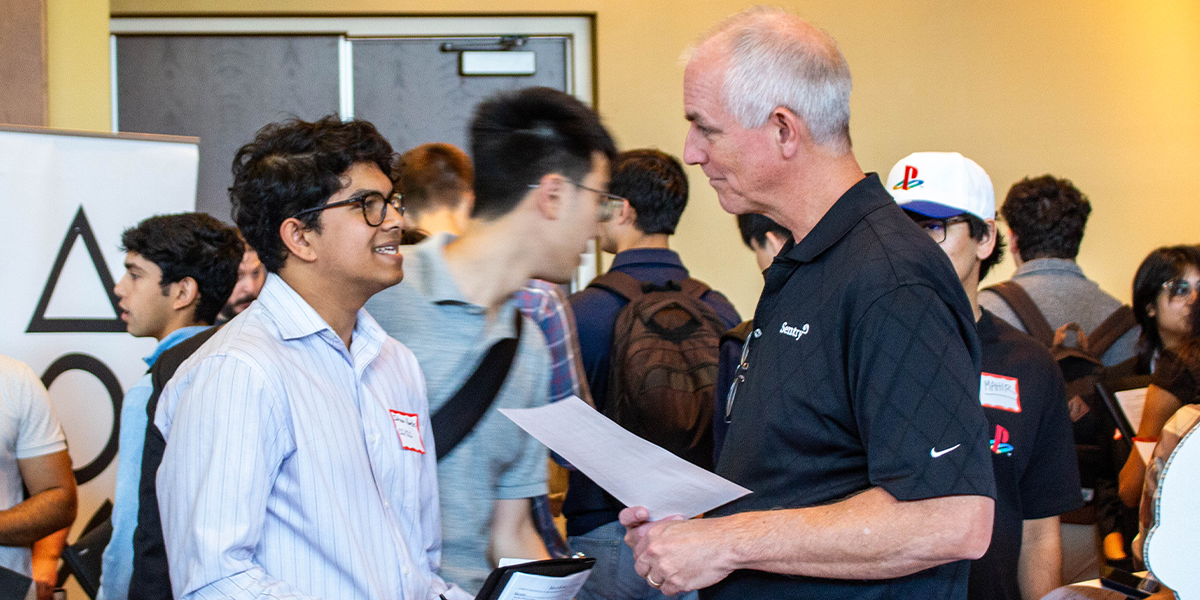
3. Recruiters also consider company culture.
It’s important to remember that you’re not just fitting into a role — you’re also fitting into a team. Get to know the company, its values, and the kinds of people you’d be working alongside. Once you determine if it’s the right fit for you, find a way to prove you’re the right fit for them.
“We’re just not a company where you come in and put your head down and don’t interact with your peers, which means I’m looking to see how students are connected to their community,” says Canzano, describing the culture at DraftKings. “If someone’s willing to step up in their school life, that means they’re ready to step up and be an active participant in an internship.”
Takeaway: Research the company culture and demonstrate how you fit into it by highlighting other ways you actively participate in professional or social groups.
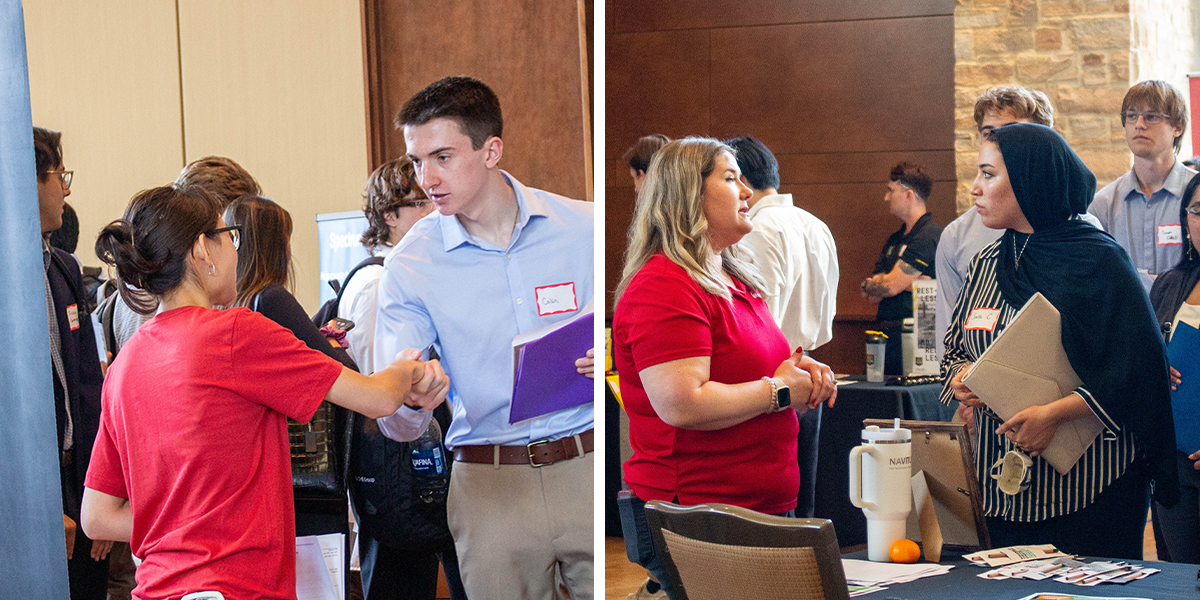
4. Your previous experience doesn’t have to be an internship.
It’s true that past internships are appealing to potential employers, but all the companies we interviewed agreed that they’re not the only way to impress. Leadership roles in clubs and other student organizations, a track record of pursuing personal projects that bring technical abilities into the real world, and customer service roles all send hiring managers signals about the skills a candidate possesses.
In applications and interviews, reiterate your ability to juggle multiple tasks, responsibilities, and commitments. Clearly communicate how your past experiences, whatever they are, connect to the job you’re applying for. Several employers we interviewed cited customer service roles as excellent experience for developing soft skills, so be sure to highlight any roles that involve communication, collaboration, and juggling priorities — and be prepared to cite specific examples.
Takeaway: Get involved on campus in whatever capacity you’re able and explain how those experiences developed specific soft or hard skills.
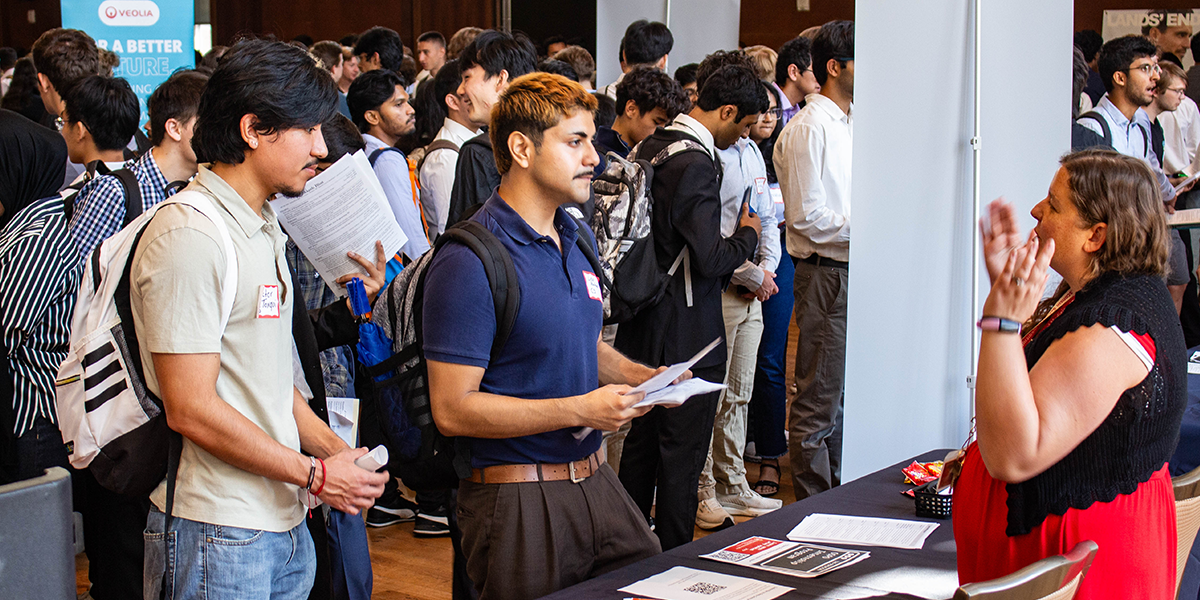
5. Memorable candidates show passion and personality.
“What I like to see in candidates is a sense of passion,” says Alex Holland, data scientist at Kohler. “Anyone can be technically sound, but we really want you to care about something, whatever that is.”
One way of doing this is to show that you care about your academic area outside the classroom — creating a portfolio of personal projects, attending conferences, and collaborating on research projects across campus are all helpful indicators of genuine passion for your chosen field.
Some recruiters also enjoy seeing more personal interests. “I’m trying to identify the human behind the resume,” says Canzano (DraftKings). Whether your interests lie in curated Spotify playlists, Wisconsin sports fandoms, or being a Beli app superuser, including a line about hobbies and interests can make you more memorable.
Takeaway: Strike a balance between personable and professional by sharing appropriate details about yourself — this makes it easier for people to imagine working with you.
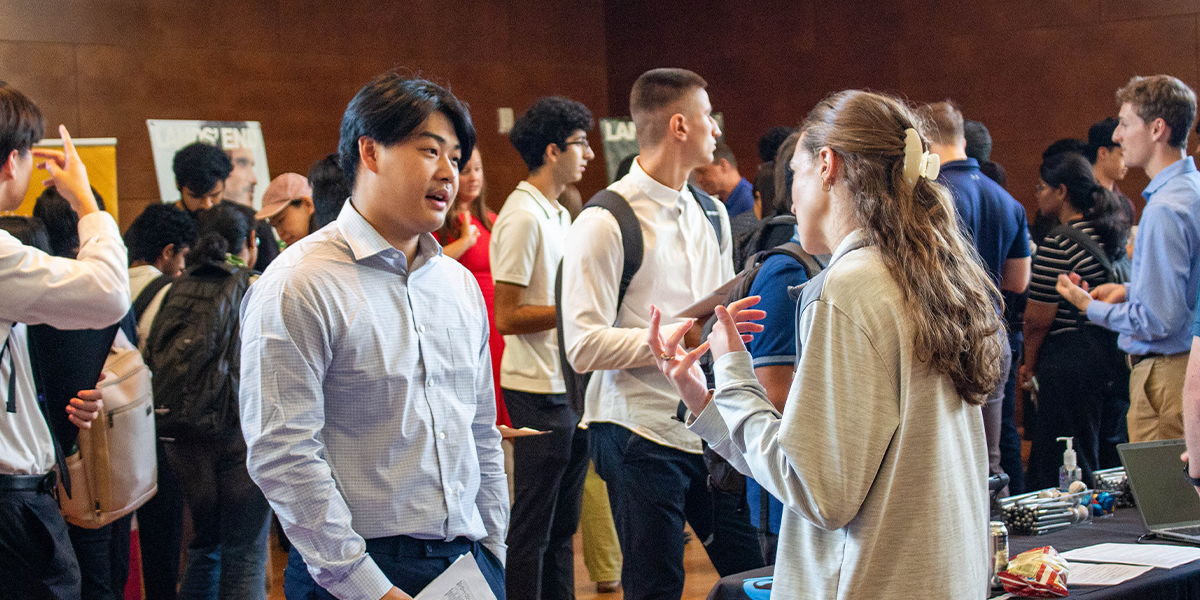
6. Go the extra mile to show your interest.
Remember that whenever you apply for a job, you’re one of many. Taking an extra step to show interest will demonstrate some of those qualities (like leadership, communication, initiative, and resourcefulness) that most impress employers.
- Attending career fairs: Most people apply for jobs online, where they inevitably end up competing with hundreds to potentially thousands of other faceless applicants. That’s part of what makes UW–Madison’s various career fairs so valuable: getting face-to-face time with the people conducting the hiring.
- Demonstrated interest in a similar industry: Katie Topel, a talent acquisition partner at Trek, a bicycle company, noted that past industry experience — whether in a retail job or by participating in outdoor sports and recreation — would set a candidate apart. Trevon Hardy, an early-talent recruiter at outerwear leader Lands’ End, expanded on this: “Within resumes, I try to look for that connection. So even if you were a dog walker, how can you connect it to Lands’ End?”
- Reach out via LinkedIn: Don’t be shy about networking with current employees or recruiters at the companies you’d like to work with. “Get creative with how you’re engaging with the company,” says Marisa DiLorenzo, technical recruiter at Fetch. “I get a ton of referrals from our engineers.”
- Get to know the company: Research the company’s specific initiatives or projects, and be prepared to discuss exactly how they connect to you and your goals.
Takeaway: Set yourself apart by doing everything you can to get in front of the recruiters, and then curate your application and interview to prove why you’re a uniquely qualified candidate.
Bonus: Answer these questions in both application and interview.
Before you submit your application, run through this list to make sure you’ve offered answers to most of these questions, explicitly or not. Think of a few concrete examples and have them ready for any interview questions that come up — being able to point to specific instances will help solidify your argument for why you’re the best candidate.
- How have I connected classroom skills to real-world problems?
- How do I show initiative?
- How do I problem-solve?
- How do I go above and beyond?
- How do I learn and grow from feedback?
- How does my previous experience connect to this specific role?
- How does this role or company connect to my personal interests?
Photos: Rachel Robey
Thank you to recruiters and hiring managers from Google, PlayStation, Epic, Trek, Lands’ End, Fetch, Travelers Insurance, DraftKings, Spectrum, Kohler, ULINE, and Sentry Insurance for providing insights.
For a full list of participating companies and future updates on the Spring 2025 Career Fair, head to the CDIS Career Fair page.
For more support on finding an internship or connecting with on-campus career support, check out SuccessWorks and UW–Madison Career Services.